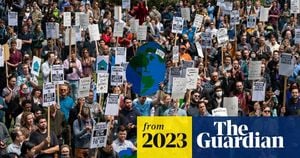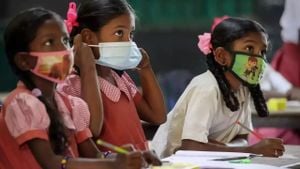Vulnerable nations expressed deep disappointment after the conclusion of the 29th Conference of the Parties (COP29) held recently in Baku, Azerbaijan, where climate finance discussions fell significantly short of expectations. The summit, anticipated as the "Finance COP," was supposed to usher in ambitious pledges to support developing countries grappling with the climate crisis. Instead, the final agreement amounted to only USD 300 billion per year starting from 2035, compared to the staggering USD 1.3 trillion annually requested by developing nations for climate mitigation, adaptation, and loss and damage by 2035.
During negotiations, which extended 36 hours beyond their planned schedule, tensions were palpable. Indian delegate Chandni Raina fiercely criticized the sum, deeming it merely "an optical illusion" during the closing plenary. "It fails to address the enormity of the challenge we all face," she stated, highlighting the frustration felt by many delegates representing developing countries.
Frustration escalated as protests erupted outside the summit venue. Activists and members of vulnerable countries demanded accountability from wealthier nations, insisting their financial contributions should match the scale of the climate crisis. This discontent became more evident when some delegates from the least-developed and island nations walked out of negotiations, unable to accept what they considered inadequate financial commitments.
While the USD 300 billion pact marks progress from the expired USD 100 billion pledge made back in 2009, it starkly contrasts the clear need for greater resources to combat climate impacts. Critics have characterized the agreement as insufficient, particularly considering the urgent requirements underscored by the Paris Agreement's goals to limit global warming to 1.5°C.
Despite the letdown, two significant developments emerged from COP29. The long-awaited operationalization of the ‘Loss and Damage Fund’ was finally achieved, aiming to aid nations suffering from irreversible climate disasters. This financial mechanism, first introduced at COP27, is viewed as pivotal for vulnerable communities, providing them much-needed resources.
Another noteworthy outcome was the implementation of Article 6 of the Paris Agreement, focusing on carbon markets. Countries and companies will now have the ability to trade emission reductions, helping to prevent additional carbon from entering the atmosphere. Prime Minister Tshering Tobgay of Bhutan remarked on the value of carbon markets, noting Bhutan’s signing of agreements with countries like Singapore to sell carbon credits, emphasizing the dual benefits of economic resilience and environmental protection.
Looking forward, all eyes are now set on COP30, planned for November 2025 in Belém, Brazil. Brazil’s rich history of environmental leadership and the stewardship of the Amazon rainforest bring hope for more decisive action and ambitious climate goals. Observers remain cautiously optimistic, acknowledging the noteworthy timeline of Brazil as host, especially following initiatives established during the 1992 Rio Summit aimed at addressing climate change.
Analyzing the broader picture, experts and delegates were quick to point out persisting gaps. COP29 has been criticized for its inability to provide adequate funding levels necessary to combat climate change actively. Calls for the meeting to serve as a platform for equitable solutions were largely unmet, with several parties expressing dissatisfaction and asserting their distrust toward the financial promises made.
According to Mark Maslin, Priti Parikh, and Simon Chin-Yee of The Conversation, there remain five urgent climate issues highlighted by the summit. These include the pressing need for increased financial investment; the challenge presented by influential fossil fuel interests; and the impacts of major global players like China and India on negotiations. If COP bureaucracies do not evolve to uproot these outdated frameworks, voicing and integrating the needs of vulnerable nations will continue to be sidelined.
Another dimension of the summit involved the outcomes surrounding methane emissions commitments. At COP29, thirty countries, which collectively emit nearly half of the world's methane, committed to reducing this potent greenhouse gas. This pledge signifies a possible shift toward employing methane capture technologies, propelling efforts to mitigate environmental degradation.
An additional focal point was the inclusion of youth voices within the summit framework. UN Secretary-General António Guterres recognized the importance of youth activism and their fundamental role as stakeholders in climate action. His sentiments centered on fostering future leadership, noting the potential influence of young people on nations' pledges and emission reduction plans moving forward.
Despite the notable decisions at COP29, the summit's overarching narrative remained one of disappointment and unfulfilled promises. Major delegations, particularly from developing nations, expressed their concerns about the fairness of proceedings, with many reviewing the financial deal as merely symbolic rather than substantive.
After tough negotiations, the hue and cry from delegates demonstrated the entrenched disparities between wealthy nations and the Global South. The deal reached may symbolize progress, but fundamentally it reinforces the existing inequalities within international climate negotiations.
Activism was palpable among the attendees, with demonstrators amplifying calls for more substantial contributions and urgent action to counter climate events ravaging vulnerable regions. Activist groups critiqued the excessively corporate-friendly environment cultivated during these negotiations and the disproportionate influence wielded by fossil fuel lobbyists. The repercussions of such relationships often mean prioritizing short-term economic goals over long-lasting ecological health.
Looking beyond the current framework, COP29 has underscored the need for renewed commitment among countries to stabilize global temperatures—especially as the world confronts predicted climate-induced challenges and extreme weather events likely to intensify.
UN Secretary-General António Guterres made it clear following the conference, stating, "This agreement provides hope for future collaboration and future climate finance innovations. Still, we must hold everyone accountable for the promises made here today." The dialogue around climate action continues to evolve, yet the road to achieving even modest climate finance goals remains fraught with dispute and division.
Each consequent COP assembly, including the upcoming COP30, must endeavor to fortify international solidarity and build stronger foundations for comprehensive climate-induced financial mechanisms. Without such measures, the very integrity of global climate agreements risks dilution under the pressure of competing national interests.
With COP30 on the horizon, the pressing challenge remains: can future negotiations move beyond mere pledges to solid commitments? Without effective action and fair financing, the reality of global warming exceeding 3°C, potentially jeopardizing countless ecosystems and communities, looms ominously.
Delegates from developing nations look toward the future with cautious hope. Yet, as the dust settles on COP29, their voices and the urgent needs of the most vulnerable populations must not be marginalized or forgotten on the long path toward climate justice and sustainability.



